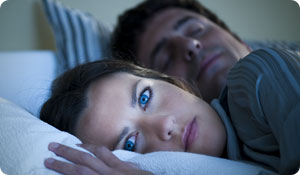
Sometimes it's hard to tell the difference between a few restless nights and full-blown insomnia. Here's help in figuring out the difference as well as steps you can take to get a restful night's sleep.
If there was one definition for normal sleep, it might be easier to know the difference between mild sleeping difficulties and true insomnia. But sleep is an individual experience, with many variations, and disrupted sleep can have many different causes, only some of which are actual forms of insomnia.
Insomnia is often referred to as a sleep disorder but it is actually a symptom of a physical or mental disorder, not an illness in and of itself. There are several different types of insomnia, characterized by an inability to fall asleep, awakenings that occur in various sleep stages throughout the night, or early morning awakenings that prevent you from getting enough sleep.
If you consistently lose sleep over the course of a week or two, you may have short-term, or transient, insomnia that will resolve itself. If you have episodes of insomnia that come and go over the course of time, you have what is known as intermittent insomnia. Chronic insomnia is sleeplessness that occurs just about every night for more than a month.
Stress, anxiety, nervousness, and depression can all cause you to suffer sleepless nights. A small problem that is resolved in relatively short order is only likely to cause temporary insomnia or some mild tossing and turning in the night. Unresolved psychological conflicts are a different story, however, and can lead to chronic insomnia.
Physical pain from chronic illness such as arthritis and other joint diseases can make it difficult to fall asleep and stay asleep. Bladder problems can wake you up and force you out of bed to use the bathroom several times a night. When you have a medical problem that interrupts sleep, the best way to treat insomnia is to treat the underlying disease.
There are also several common environmental causes of insomnia, such as outside noise or a noisy sleep partner. Too much light entering your bedroom in the morning can routinely wake you up earlier than necessary. Routine use of caffeine, alcohol, and drugs can also contribute to sleepless nights. In all of these cases, lifestyle changes can provide the solutions. White noise machines and ear plugs that drown out sound; heavy, light-blocking drapes; and limited use of stimulating products can all change the nature of your sleep.
However, if you cannot identify the cause of any persistent loss of sleep that lasts more than three or four weeks, you may need medical attention. Even if you do know the cause of your problem but you can't find a solution, it can help to speak to your doctor. Over-the-counter sleep aids are not long-term solutions and rarely help improve overall quality of sleep. Your doctor can discuss with you the many medical treatments, therapies, and lifestyle options that are available and how they can be tailored to your particular situation.
Sources:
Holbrook, A., et al. "The Diagnosis and Management of Insomnia in Clinical Practice." CMAJ 2000;162(2):216-20. Web 12 May 2011
http://www.sjsu.edu/people/jennifer.gregg/courses/c4/s1/sleep_article.pdf
Ohio State University Medical Center: Insomnia Web 12 May 2011
http://medicalcenter.osu.edu/patientcare/healthcare_services/mens_health/insomnia/Pages/index.aspx





